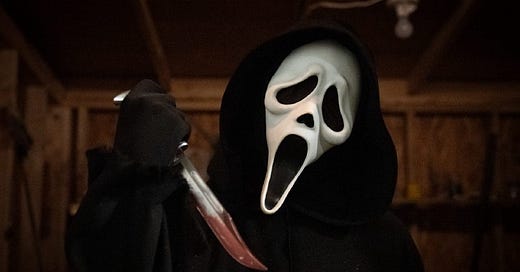Twenty-five years after a streak of brutal murders shocked the quiet town of Woodsboro, a new killer has donned the Ghostface mask and begins targeting a group of teenagers to resurrect secrets from the town’s deadly past.
The horror genre was all but dead when Scream was released in 1996. More than 25 years later, Scream (2022) exists to comment on the progression of a genre that is a direct result of that original film.
Simultaneously, the franchise is known for studying and parodying that genre. Every few years they check-in to comment on the state of things in their neck of the woods. They remind you that the best horror films are all about surprises and nobody’s better at it than them.
That’s a blessing and a curse.
Yes, we appreciate the reminder that horror movies are supposed to be fun (they’re not afraid to call out The Babadook), but they’re shackled by the self-imposed burden of being above the noise.
How do you subvert expectations when everyone expects a subversion? Is that even possible?
When watching a Scream film, we’ve come to expect certain things. Yes, a critique of the horror world at large is chief among them. In this case, it’s the issue of legacy sequels (or as the film calls them “requels” — not quite a reboot and not quite a sequel). These are the films that continue a franchise’s continuity years after the most recent film, both reviving it for a modern audience and bringing in the nostalgia dollars. We’ve seen it across the film world multiple times in the past few months alone with franchises like The Matrix and Ghostbusters. The horror world has seen it as well in David Gordon Green’s new Halloween timeline and (a highlight of the bunch) Nia DaCosta’s Candyman.
This is not the first time Scream has commented on the status quo. They defined the rules of horror in the 90s, effectively making all of those tropes off-limits. They criticized a woman’s role in Hollywood in a film produced by Harvey Weinstein in Scream 3. And now they’re tackling legacy sequels.
Problem is: They’ve already done this. It was called Scream 4.
And that movie wasn’t very good.
And aside from a few low-stakes nods at that film, it all but ignores the fact that it is parodying a mistake the franchise already made. And is making again now.
Just like in Scream 4, it’s been over a decade since Woodsboro saw a Ghostface killer. Sidney, Gale, and Dewey are off doing the things you would expect them to do after spending their entire adult lives running from a masked maniac, so we spend some time with the latest batch of local teenagers. Conveniently, they’re both related to characters from the previous films and horror film buffs — so we’re able to recreate set piece after set piece from previous entries.
They’ve already made this movie.
Fortunately for them, they do have one thing going for it when compared to the franchise’s first legacy sequel — it’s much better.
While Scream 4 takes the meta inside of meta route, Scream (why didn’t they call it Scream 5 — even better: 5CREAM) chooses the path of homage above all else. It’s the first film in the franchise to not be directed by the legendary late Wes Craven, and this film chooses nostalgia over anything, which is both the correct choice and directly hypocritical of its thesis. More on that later.
Compared to its predecessor, it’s a film that’s far more fun, far less predictable, and occasionally actually surprising: you can’t make a Scream movie without a pair of killers, for example. Try and figure it out during the course of the film’s runtime and you will, turn your brain off and the surprise will catch you.
But I found it nearly impossible to turn off the part of my brain that kept saying, “Yeah sure, legacy sequels can be annoying. But didn’t they already make that mistake?”
What happens to the franchise’s synonymous self-aware when it should be self-critical?
George W. Bush put it best, “There’s an old saying in Tennessee…that says, ‘Fool me once, shame on…shame on you. Fool me — you can’t get fooled again.’”
Don’t get me wrong, I’ll keep watching Scream movies if they keep making them. And I enjoyed this entry and would watch it over the previous two. But the Scream films try to be more than just an enjoyable night at the movies. They have something to say. And I’m simply at a loss as to how a thesis that includes the phrases “requel,” “elevated horror,” and “toxic fandom” is best served by committing many of those same sins.
When I saw another recent legacy sequel, The Matrix Resurrections, a few weeks ago, I wrote the following review on Letterboxd. I have not altered a single word, but somehow I could’ve written the same exact thing for the latest Scream:
I truly cannot tell if this is the perfect follow-up to a series two decades old as it is both self-aware and critical of 21st-century media production and consumption OR a direct product of the very thing it pretends to criticize and completely misses the point by merely existing.
Legacy sequels can literally have copied and pasted reviews. It makes no sense to me that we put down Space Jam: A New Legacy for all of the same reasons, but don’t see the problem in the latest Matrix installment. Scream (2022) is entertaining, but not at all any different.
Credit: Plot synopsis from Letterboxd via TMDb.






